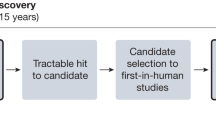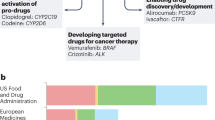Abstract
Innovation in diagnostics will be essential for the successful adoption of personalized medicine and will also have a major impact on the success of drug development strategies. To remain competitive, companies will need to embrace the rapid innovation in the diagnostic market, utilize diagnostic tools concurrently with research and development, and re-invent how new drugs are brought to market. In this article, specific examples of targeted oncology drugs are used to illustrate the general impact of genetic diagnostics on drug development.
This is a preview of subscription content, access via your institution
Access options
Subscribe to this journal
Receive 12 print issues and online access
$209.00 per year
only $17.42 per issue
Buy this article
- Purchase on SpringerLink
- Instant access to full article PDF
Prices may be subject to local taxes which are calculated during checkout

Similar content being viewed by others
References
Collins, F. S. Personalized medicine. The Boston Globe (17 July 2005).
International Human Genome Sequencing Consortium. Finishing the euchromatic sequence of the human genome. Nature 431, 931–945 (2004).
Nowell, P. C. & Hungerford, D. A. A minute chromosome in human chronic granulocytic leukaemia. Science 132, 411–420 (1960).
Fearon E. R. & Volgelstein, B. A genetic model for colorectal tumorigenesis. Cell 61, 759–767 (1990).
Gleevec US Package Insert. [online],
Druker, B. J. et al. Efficacy and safety of a specific inhibitor of the BCR-ABL tyrosine kinase in chronic myeloid leukemia. N. Engl. J. Med. 344, 1031–1037 (2001).
Druker, B. J. et al. Activity of a specific inhibitor of the BCR-ABL tyrosine kinase in the blast crisis of chronic myeloid leukemia and acute lymphoblastic leukemia with the Philadelphia chromosome. N. Engl. J. Med. 344, 1038–1042 (2001).
Slamon, D. J. et al. Use of chemotherapy plus a monoclonal antibody against HER2 for metastatic breast cancer that overexpresses HER2. N. Engl. J. Med. 344, 783–792 (2001).
Piccart-Gebhart, M. J. et al. Trastuzumab after adjuvant chemotherapy in HER2-positive breast cancer. N. Engl. J. Med. 353, 1659–1672 (2005).
Romond, E. H. et al. Trastuzumab plus adjuvant chemotherapy for operable HER2-positive breast cancer. N. Engl. J. Med. 353, 1673–1684 (2005).
Slamon, D. J. et al. Studies of the HER-2/neu proto-oncogene in human breast and ovarian cancer. Science 244, 707–712 (1989).
Pegram, M. D., Konecny, G. & Slamon, D. J. The molecular and cellular biology of HER2/neu gene amplification/overexpression and the clinical development of herceptin (trastuzumab) therapy for breast cancer. Cancer Treat. Res. 103, 57–75 (2000).
Surveillance, Epidemiology, and End Results (SEER) Program, Cancer Statistics Review, 1975–2002 [online], (2002).
Salomon, D. S. et al. Epidermal growth factor-related peptides and their receptors in human malignancies. Crit. Rev. Oncol. Hematol. 19, 183–232 (1995).
Fukuoka, M. et al. Multi-institutional randomized phase II trial of gefitinib for previously treated patients with advanced non-small-cell lung cancer (The IDEAL 1 Trial). J. Clin. Oncol. 21, 2237–2246 (2003).
Kris, M. G. et al. Efficacy of gefitinib, an inhibitor of the epidermal growth factor receptor tyrosine kinase, in symptomatic patients with non-small cell lung cancer: a randomized trial. JAMA 290, 2149–2158 (2003).
Press release. Gefitinib (Iressa™) lung cancer ISEL trial shows no overall survival advantage in a highly refractory population [online], (17 December 2004).
Lynch, T. J. et al. Activating mutations in the epidermal growth factor receptor underlying responsiveness of non-small-cell lung cancer to gefitinib. N. Engl. J. Med. 350, 2129–2139 (2004).
Paez, J. G. et al. EGFR mutations in lung cancer: correlation with clinical response to gefitinib therapy. Science 304, 1497–1500 (2004).
Wingo, P. A. et al. Annual report to the nation on the status of cancer, 1973–1996, with a special section on lung cancer and tobacco smoking. J. Natl Cancer Inst. 91, 675–690 (1999).
Gorre, M. E. et al. Clinical resistance to STI-571 cancer therapy caused by BCR-ABL gene mutation or amplification. Science 293, 876–880 (2001).
von Bubnoff, N. et al. BCR-ABL gene mutations in relation to clinical resistance of Philadelphia-chromosome-positive leukaemia to STI571: a prospective study. Lancet 359, 487–491 (2002).
Branford, S. et al. High frequency of point mutations clustered within the adenosine triphosphate-binding region of BCR/ABL in patients with chronic myeloid leukemia or Ph-positive acute lymphoblastic leukemia who develop imatinib (STI571) resistance. Blood 99, 3472–3475 (2002).
Shah, N. P. et al. Overriding imatinib resistance with a novel ABL kinase inhibitor. Science 305, 399–401 (2004).
Sawyers, C. L. et al. Dasatinib (BMS-354825) in patients with chronic myeloid leukemia (CML) and Philadelphia-chromosome positive acute lymphoblastic leukemia (Ph+ ALL) who are resistant or intolerant to imatinib: update of a phase I study. Blood 106, A38 (2005).
Hochhaus, A. et al. Efficacy of dasatinib in patients with chronic phase Philadelphia chromosome-positive CML resistant or intolerant to imatinib: first results of the CA180013 'START-C' phase II study. Blood 106, A41 (2005).
Press release. Bristol-Myers Squibb submits new drug application for dasatinib [online], (28 December 2005).
Press release. Genzyme launches exclusive lung cancer test [online], (27 September 2005).
Acknowledgements
I would like to thank C. I. Rodriguez, T. M, Henrick and J. E. Miller for helpful comments and discussion in reviewing this manuscript
Author information
Authors and Affiliations
Related links
Related links
DATABASES
National Cancer Institute
FURTHER INFORMATION
Rights and permissions
About this article
Cite this article
Million, R. Impact of genetic diagnostics on drug development strategy. Nat Rev Drug Discov 5, 459–462 (2006). https://doi.org/10.1038/nrd2034
Published:
Issue Date:
DOI: https://doi.org/10.1038/nrd2034
This article is cited by
-
Influence of Pharmacogenomic Profiling Prior to Pharmaceutical Treatment in Metastatic Colorectal Cancer on Cost Effectiveness
PharmacoEconomics (2013)
-
Personalized medicine in oncology: next generation
Nature Reviews Drug Discovery (2011)
-
An integrated approach to prognosis using protein microarrays and nonparametric methods
Molecular Systems Biology (2007)



